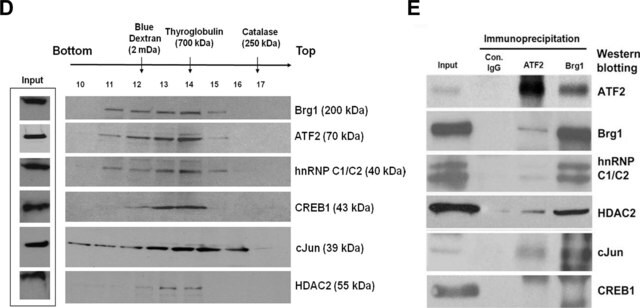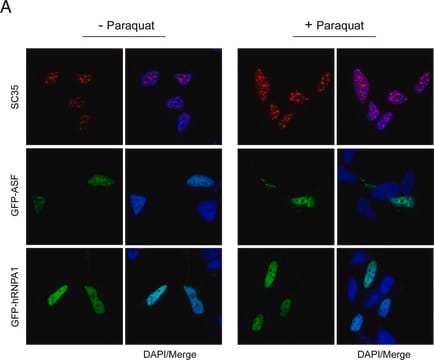MABE241
Anti-dimethyl-phospho Histone H3 (Lys9/27)/(Ser10/28) Antibody, clone 51TA-2H12
ascites fluid, clone 51TA-2H1, from mouse
Synonyme(s) :
Histone H3.1, Histone H3/a, Histone H3/b, Histone H3/c, Histone H3/d, Histone H3/f, Histone H3/h, Histone H3/I, Histone H3/j, Histone H3/k, Histone H3/l
About This Item
Produits recommandés
Source biologique
mouse
Niveau de qualité
Forme d'anticorps
ascites fluid
Type de produit anticorps
primary antibodies
Clone
51TA-2H1, monoclonal
Espèces réactives
human
Technique(s)
dot blot: suitable
immunocytochemistry: suitable
immunohistochemistry: suitable
immunoprecipitation (IP): suitable
western blot: suitable
Isotype
IgG1κ
Numéro d'accès NCBI
Numéro d'accès UniProt
Conditions d'expédition
wet ice
Modification post-traductionnelle de la cible
phosphorylation (pSer10/pSer28), dimethylation (Lys9/Lys27)
Informations sur le gène
human ... HIST1H3F(8968)
Description générale
Spécificité
Immunogène
Application
Epigenetics & Nuclear Function
Histones
Dot Blot Analysis: A representative lot was used by an independent laboratory in unmodified and modified Histone H3 peptides. (Eberlin, A., et al. (2008). Molecular and Cellular Biology. 28(5):1739–1754.)
Immunocytochemistry Analysis: A representative lot was used by an independent laboratory in NIH/3T3 cells. (Eberlin, A., et al. (2008). Molecular and Cellular Biology. 28(5):1739–1754.)
Immunohistochemistry Analysis: A representative lot was used by an independent laboratory in mouse testis tissue. (Eberlin, A., et al. (2008). Molecular and Cellular Biology. 28(5):1739–1754.)
Immunoprecipitation Analysis: A representative lot was used by an independent laboratory in HeLa cells. (Eberlin, A., et al. (2008). Molecular and Cellular Biology. 28(5):1739–1754.)
Qualité
Western Blot Analysis: A 1:5,000 dilution of this antibody detected Histone H3 on 10 µg of untreated and etoposide acid extract treated HeLa cell lysates.
Description de la cible
Forme physique
Stockage et stabilité
Handling Recommendations: Upon receipt and prior to removing the cap, centrifuge the vial and gently mix the solution. Aliquot into microcentrifuge tubes and store at -20°C. Avoid repeated freeze/thaw cycles, which may damage IgG and affect product performance.
Remarque sur l'analyse
Untreated and etoposide acid extract treated HeLa cell lysates.
Clause de non-responsabilité
Vous ne trouvez pas le bon produit ?
Essayez notre Outil de sélection de produits.
Code de la classe de stockage
12 - Non Combustible Liquids
Classe de danger pour l'eau (WGK)
nwg
Point d'éclair (°F)
Not applicable
Point d'éclair (°C)
Not applicable
Certificats d'analyse (COA)
Recherchez un Certificats d'analyse (COA) en saisissant le numéro de lot du produit. Les numéros de lot figurent sur l'étiquette du produit après les mots "Lot" ou "Batch".
Déjà en possession de ce produit ?
Retrouvez la documentation relative aux produits que vous avez récemment achetés dans la Bibliothèque de documents.
Notre équipe de scientifiques dispose d'une expérience dans tous les secteurs de la recherche, notamment en sciences de la vie, science des matériaux, synthèse chimique, chromatographie, analyse et dans de nombreux autres domaines..
Contacter notre Service technique








